- Home
- Richard Adams
The Plague Dogs: A Novel Page 8
The Plague Dogs: A Novel Read online
Page 8
They loped across the bare ground, past the old youth hostel hut and the millrace beyond, splashed through Levers Water beck and began to climb, on the line of Low Water beck, into the high wilderness on the eastern slopes of the Coniston range. The wind freshened, its sound in the heather rising at times to a shrill whistling, and carried the clouds continually across and away from the sun moving on towards noon, while their shadows, with never a sound, flowed down the slopes faster than swallows or drifting rain. Among the stones nothing moved. Further and higher into this solitude, with many halts and pauses, the dogs hesitantly ascended as the morning wore on. More than once, topping a slope or rounding a boulder, they came unexpectedly upon a grazing yow, and as she made off chased her, barking and snapping at her heels for forty or fifty yards until they lost interest or some other scent distracted them from pursuit. Once, not far away, a circling buzzard closed its wings and dropped into the grass. Some small creature squealed, but before they reached the place the buzzard rose again with no prey to be seen in beak or talons. Rowf watched it turn into the wind and slide away.
“Better not fall asleep here.”
“Not in the open, no. Snippety-snap—don’t bother to open your eyes—you haven’t got any.” Snitter’s short legs were tiring. He lay panting on a patch of smooth turf littered with sheep’s droppings while Rowf, in curiosity, cast unsuccessfully about for traces of the buzzard’s victim.
Still climbing, they crossed a green path and above it the stream became yet more narrow, with many shallow falls into brown pools overhung by glistening patches of liverwort and tussocks of grass fine as horsehair. The ascent grew steeper until, reaching at last the lip of yet another hanging valley, they came all unawares upon Low Water, that still and secret tarn that lies enclosed under the precipices of Old Man and Brim Fell.
Rowf, leading the way past strange, pillar-like rocks canted upright as though set by human hands long ago, shrank back from the outfall, cowering at sight of the placid pool. In this seldom-visited place, windless and silent, the tarn and its surroundings lay as they must have lain for millennia past, unchanged by any accident or act of man. Through the limpid, grey-green water, perhaps a hundred and fifty yards across and nowhere more than a few feet in depth, could be seen clearly the stones of the bed, streaked here and there with a peaty silt. On the further side, the screes of Old Man fell sheer into the rippleless shadows, the mountain, rising nine hundred feet to its summit, shutting off half the sky above. In the unexpectedness of the tarn’s disclosure, and the stillness of its stones and water, there seemed a kind of malignant vigilance—the cold assurance of one who, in silence, watches a fugitive or culprit unawares, waiting without haste for the moment when he will turn and look up, to learn from that impassive face that flight or concealment is useless and that all that he supposed secret has been observed and known from the first.
With a howl of dismay, Rowf fled up the slope towards Raven Tor. Snitter overtook him in a stony gully and he turned on him, panting and snarling.
“I told you, Snitter—I told you, didn’t I? It doesn’t matter where we go. The whitecoats—”
“Rowf, there’s no one there—nothing—”
“You never saw the tank–it’s just like that—in fact that is a tank, only a bigger one—the water doesn’t move—you can see right down into it—then they pick you up—”
As some honest soldier might find his straightforward, workaday warmth and staunchness no match for the onset of shell-shock in a comrade, so Snitter, his desire to reassure overwhelmed by Rowf’s vehemence, lay down without further talk, feeling against his own body his friend’s tension and fear. After some time Rowf said, “I suppose they must be waiting somewhere—the whitecoats. Where do you think they’re hiding?”
“It’s not for us—not that water—it’s too big—they must have made it for some bigger animal—” Snitter, unable to explain away the sudden and unforeseeable appearance of the tarn and almost convinced by Rowf’s terrified certainty, was nevertheless still searching for some kind of reassurance.
“What animal, then? They obviously made it, didn’t they—those men down there with the lorries—”
“For the sheep, of course,” said Snitter, hoping desperately that it might be true. “Yes, that must be it. I tell you, we’ve escaped. They do it to other animals here—not to us. Look at the clouds—look at the beck—they only go one way—they never go backwards, do they? We shan’t go back either.”
“We can’t stay here, though.” With a down-pattering of stones, Rowf got up and padded over the shoulder of the tor.
The sight of Levers Water, a much larger tarn, with men’s work clear to be seen in the concrete embankment and dam at the outfall, provoked in him, surprisingly, no further fear. As a stag or fox, having started up at the first scent of hounds or sound of the horn, will then collect its wits and begin in earnest to call upon its powers of cunning and endurance, so Rowf, having once come upon and accepted the evidence of what he had all along more than suspected—the ubiquity of the whitecoats—seemed now to have braced himself to contend with it as best he could. Within seconds of their first glimpse of the lake four or five hundred yards away at the foot of the slope, he had drawn back and crouched down behind a boulder. As soon as Snitter was in concealment beside him he wormed his way forward to a place from where, between two stones, he could look out over the water without exposing himself to view.
For nearly an hour the two dogs lay watching for any sign of human presence or approach. Once, almost a mile away, a man appeared over the shoulder of High Fell on the further side of the lake. For a few moments he remained within their view, waving one arm and shouting loudly to someone or something out of sight. His high-pitched, stylized cries carried clearly across the valley. Then he strode on and was lost to sight.
“He wasn’t—well, he didn’t look like a whitecoat,” said Rowf uncertainly.
“No. But he looked like the tobacco man, and he sounded rather like him, too.” Snitter had become devil’s advocate. “All the same, that other water back there, where we’ve come from—it wasn’t like anything you’ve ever told me about the tank—”
“It was—I tell you—just because it didn’t smell of metal—”
“Smell’s always the thing to go by, but I admit that doesn’t necessarily mean it’s all right. Lorries don’t smell of anger, for the matter of that—no blood, no mouth-smell, nothing—but they come and kill—”
He broke off. Rowf made no reply and after a little Snitter went on, “But what’s going to become of us? What are we going to do? They’ve taken away the whole natural world. There’s nothing to eat. We’ll have to go back.”
For a long time Rowf made no reply. At last he said, “There’s something—a smell in my mind—pitter-patter—very small—whiskers—”
A gust of wind came pushing round the shoulder, raced away down the fell and wrinkled, tugging, across the broken cloud reflections on the surface of the tarn. They could see the ripple pull up sharp and turn towards the outfall as it met and mingled with some other air current in the basin.
“A mouse—there was a mouse came into my pen—we talked—”
“They’re bits of biscuit that get left over, you know. Make yourself a few teeth from bone splinters, pick up a tail and off you go. Well, it’s a living. Sometimes they’re fleas trying to better themselves. My dam told me. That must be why there’s one in my head, I suppose. They get everywhere.”
“This mouse said men never did anything to him—not like us—”
“Then they couldn’t have given him food either.”
“No, he had to find it. That was why he was there. We had food, you see. But he didn’t have anything to do with men, this mouse. He just took what food he could get and lived that way.”
“Well, but the whitecoats would kill him if they could, wouldn’t they? I remember the tobacco man once running about, trying to stamp on one he saw.”
“Ah, that’s j
ust it. What did the mouse do?”
“Got away down one of the gully-holes in the floor.”
“Yes.” Rowf looked up as a buzzard sailed into view, hovered a few moments, evidently decided to leave them alone and disappeared.
“The whitecoats would kill him if they could catch him,” said Rowf. “But he took care they didn’t, this mouse. That was how he lived, he told me. He only came out at night, slept down a hole—”
“Danced on his tail to save wearing out his paws. Wore a very small paper bag to keep off the rain—”
Rowf turned to snap, and Snitter jumped up and ran away a few yards among the loose stones. Rowf, about to follow, saw him check and remain staring.
“What?”
Snitter did not answer and Rowf joined him.
Far off, over the further brim of the valley, the man had returned. As the sound of his cries once more reached them, they saw the grey, pendent-coated shapes of two sheep appear, running hard over the brow higher up. Behind them, a black-and-white dog came racing out from among the crags, dodging in and out of the heather-clumps as it went. They watched it run in a wide half-circle before turning to descend towards the sheep, which thereupon changed direction and began to run downhill. Meanwhile the man, striding swiftly, had almost reached the edge of the tarn. At his further cry the dog stopped dead and lay down, while a moment later another dog came into view, chasing before it a third yow who ran to join the other two.
With a whine of delight, Snitter sprang to his feet.
“Rowf! Look! Take a good look! That, Rowf, is a master—a real master of dogs! We’re home and dry, Rowf, and I was right and you were wrong! Oh, Snit’s a good dog! pass me a piece of that blue sky and I’ll chew it up! Toss me a lamp-post and I’ll carry it home! Come on, quick!”
“Where? What for? Snitter, wait—”
“We go and do what they’re doing, don’t you see, and then the man’ll take us home with him! What luck! Come on!”
Snitter was off as fast as his short legs would carry him, scraping the pads of his paws on the rough stones, tumbling in and out of peaty rifts, thrusting breast-high through sheaves of wet heather. Rowf at first remained where he was, but when Snitter was well down the slope and showing no sign of hesitation or second thoughts, he too came out from their hiding-place and followed. He overtook him splashing through Cove Beck, above the steep crags north-west of the tarn.
“Snitter, wait, I tell you! I don’t understand!”
“Neither do I, altogether. My master used to throw sticks, but it’s all the same. When you go out of doors with a master, he always likes you to run about and do things. This man must have sheep instead of sticks, that’s all.”
At this moment a yow which they had not seen got up a little distance ahead of them and began to trot quickly away. Instantly Snitter set off in pursuit, barking loudly, and after a few moments Rowf copied him. The yow broke into a sheep-gallop, covering the uneven ground with leaps and quick turns and leaving hanks of its unclipped fleece trailing as it pushed through the patches of furze. Snitter, catching the coarse, warm smells of wool and sheep-dip, became even more excited, snapping and barking in the heat of pursuit. He put up another yow and as he overtook it found Rowf at his shoulder, charging into action like a hound in full cry. His voice rang over the fell.
“Rowf! Grrrrr-owf, rowf! We’ll show ‘em! We’ll show ‘em! Rowf, rowf!”
Both yows turned suddenly and ran back by the way they had come, blundering past the dogs with a quick clitter-clatter of narrow, agile hooves. Snitter was off again, this time biting at their very heels. Away below, on the nearer shore of the tarn now, but separated from them by the sheer crags, he caught a glimpse of the man, his cloth cap pushed back on his fell of hair, waving a long thumb-stick and apparently yelling encouragement. His teeth nipped the hindmost yow just above the hock and for a moment he tasted blood before she kicked backwards and her hoof took him in the muzzle. Dazed, he sat back on his haunches, panting.
“Hey! What th’ ‘ell doost think th’art playin’ at? Art stark bluidy mad or what?”
Snitter looked up. Just above him, on a peat-bank, one of the black-and-white sheep-dogs was standing, glaring down with an expression of mingled bewilderment and blazing fury. It smelt as angry as any dog Snitter had ever encountered in his life. Frightened and confused, he said, “It’s all right—we—er—we don’t mean you any harm—you see, we need a master—we’re straying—we were just joining in—”
Rowf was beside him now, silent and waiting.
“Art out of thy minds, chasing yows oop an’ down fell, snappin’ an’ bitin’? Wheer’s thy farm at? Wheer’s thy masster? Tha’s nipped yon yow, too, tha basstard—it’s bleeding, is yon—”
The sheep-dog became inarticulate with rage and incomprehension. So overwhelming was his indignation that, like thunder or the smell of a bitch, it swept everything else from Snitter’s mind. The excitement of the chase, his confidence in the friendliness of the man down by the tarn, his hopes of adoption—these vanished as he found himself confronting—as unexpectedly as Rowf had been confronted by Low Water—the outraged, incredulous anger of the sheep-dog. There could be no question of talk or argument. It was like a bad dream. Whatever innocent fault they had committed, it must be something worse than vomiting on a carpet or biting a child; and evidently the sheep-dog was merely the sharp end of a whole world’s wedge of anger.
Snitter lay still as a stone while the dog came down and sniffed him over.
“I—I’m sorry—sir—you see—we—we didn’t know—”
“Lay off!” cried Rowf angrily to the sheep-dog. “You let him alone! You don’t own this place—”
“Doan’t oan it? Then I’d like to know who bluidy dooz. Hey, Wag,” cried the dog to his colleague, who now came running towards them, “it says we doan’t oan this fell ’ere!”
“Bluidy cheek!” The second dog bristled. He looked, thought Snitter, a most ugly customer, smelling strongly of a more-or-less permanent disposition to attack. “What they reckon theer oop to, then?”
“Cheek yourself!” Rowf, the biggest dog of the four, was on his feet, hackles up and teeth bared. “What are you doing here, if it comes to that?”
“Getherin, ye dafft sod! Seekin’ woolled sheep, a’ course. An’ then tha cooms down from top—like bluidy bulls on the loose—an’ spoils hafe an hour’s good work—”
“Ay—they’ll be tourists’ tykes, tha knaws,” said the first dog. “Thee, with yon patch on thy head, wheer’s thy masster at?” he demanded for the second time. “Is he oop fell? Hast roon away, tha feckless gowks?”
“No, we haven’t a master. We want to meet yours—we didn’t mean any harm—”
“He’ll fill thee wi’ lead, joost,” said the second dog, snapping quickly at a moth that came fluttering out of the underbrush. “Ay, he will that.”
“He hasn’t got a gun,” said Snitter.
“Happen he has,” returned the dog. “Thee bide around theer and thee’ll soon find out. Hey, Wag, remember yon dog he shot last soommer, when it were chasin’ doocks, tha knaws—”
“Ay. He were—” The first dog seemed about to enlarge on this pleasant recollection when a perfect fusillade of cries rose from somewhere out of sight beneath the sheer face below them.
“Don, lay down! Don, lay down! Wag, coom bye ’ere! Wag, coom bye ’ere! Yer Wag! Yer Wag!”
“Get off fell, tha booggers, that’s all,” said the second dog. “Goo on awaay!”
It raced off, responding, as it came into his view, to further instructions from the shepherd below. The first dog, Don, remained crouching tensely on the grass, tongue lolling and front paws outstretched, paying Snitter and Rowf no further attention whatever until, at a sudden cry of “Don, gow way! Don, gow way!” it leapt up, gave a single bark and tore uphill, climbing to get above and so turn two yows which were running before Wag. Snitter and Rowf looked at each other.
“Thee’d best watch these
n,” said Rowf bitterly. “Happen—”
“Oh, it isn’t funny.” Snitter was distraught. “I don’t understand. We were only doing the same as them—”
“They didn’t want us to join their man. Jealous.”
“Perhaps. I remember a cat that hid behind the door spit spit cuff scratch—just the same. No, but they were—oh, clouds in the sky, leaves on a tree, bark when you hear the key in the door—they belonged where they were, didn’t they; they were at home? You could smell it. No whitecoat does anything to them. But what are we going to do, Rowf?”
“We’ve got to get out of here,” said Rowf, “before they come back. Teeth rip it, yes and quick! My dam, the man’s coming, look!”
Sure enough, the man with the thumb-stick had appeared round one end of the line of crags and was hurrying towards them in silence. They could see the teeth in his face and smell his meaty sweat and manure-mucky boots. Yet even as they made off up the fell, he too turned aside and disappeared, evidently satisfied to have seen the back of them and not wishing to leave his gethered sheep any longer in the sole care of his dogs.
Higher and higher. The wind had died altogether now and the heights ahead had become invisible under a sudden mist. It seemed the very manifestation of their hopelessness and bewilderment. There was no longer any trace of destination or purpose in their wandering. Upward they went in silence—for they did not know where else to go or what to do—close together, tails drooping, unresponding even when some creature—a rat or rabbit, half-concealed in the mirk-startled and ran across their front. The grass grew sparser and then was no more. They were in a barren land, a blotted-out place of loose stones and bare rocks, steep and high up. The mist swirled about them, thickening the higher they went and smelling of dampness, of wet lichen on the rocks, of a dead sheep somewhere and faintly, beneath all else, of the salt sea. They were climbing the 2,300-foot pitch of Levers Hause, the near-precipitous band between Brim Fell and Swirral; as wild, grim and lonely a place as any in the Lakeland. Night was falling and in all the waste about them they knew of no food, no shelter, no friend.

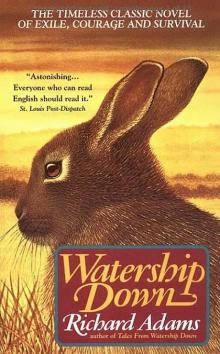 Watership Down
Watership Down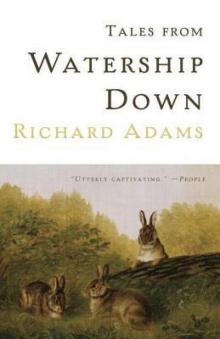 Tales From Watership Down
Tales From Watership Down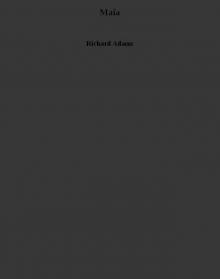 Maia
Maia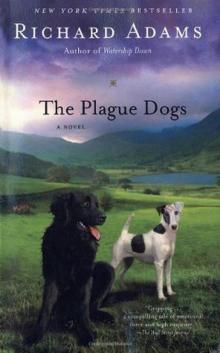 The Plague Dogs
The Plague Dogs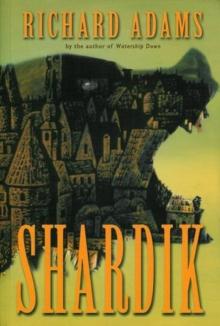 Shardik
Shardik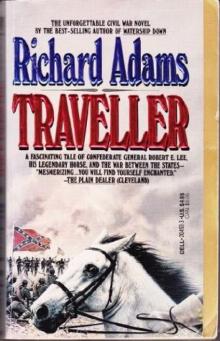 Traveller
Traveller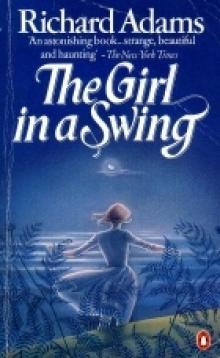 The Girl in a Swing
The Girl in a Swing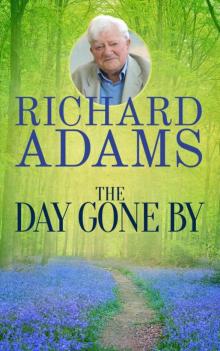 The Day Gone By
The Day Gone By Daniel
Daniel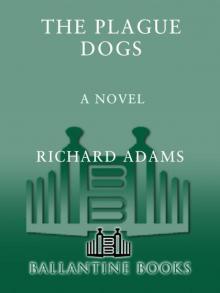 The Plague Dogs: A Novel
The Plague Dogs: A Novel